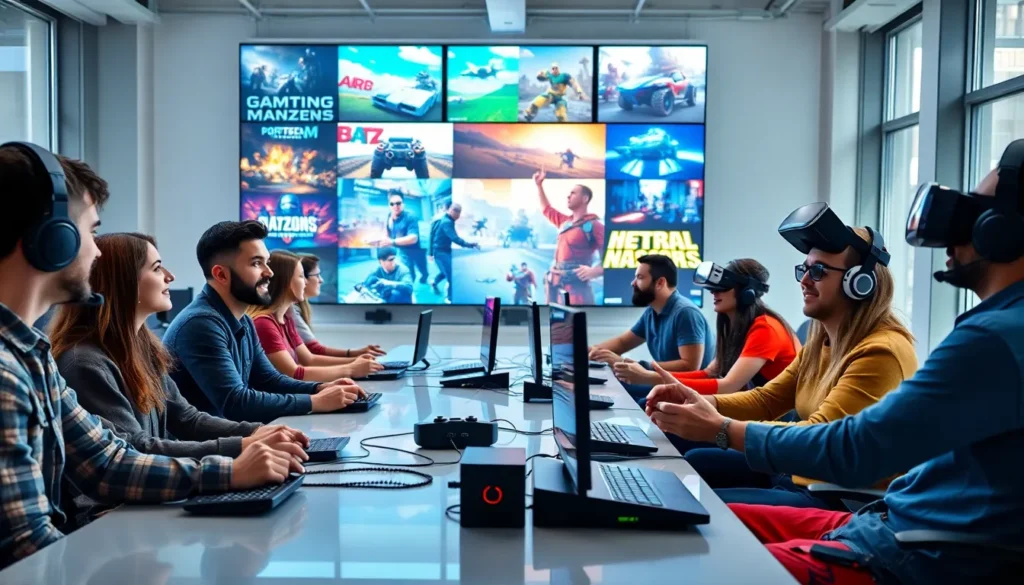Table of Contents
ToggleWhen you think of gaming, do you envision a basement filled with nostalgic consoles or a sprawling online world bursting with adventure? Gaming culture has evolved like a fine wine, maturing and changing over the years, and perhaps you’ll be surprised to learn just how rich that history truly is. In this exploration, you’ll jump into the depths of gaming’s past, present, and future, as well as the various genres that cater to every kind of player. So, grab your controller, and let’s jump into the ever-expanding universe of gamer ramblings.
The Evolution of Gaming Culture

Early Beginnings: The Birth of Video Games
The story of video games is like a well-loved fairy tale, full of innovation, excitement, and sometimes, a bit of chaos. Picture this: the 1970s, where computers were a rarity and arcade games were taking baby steps. Enter Pong, a simple yet addictive game that set the stage for the future of entertainment. From those pixelated beginnings, gaming has transformed into a multi-billion-dollar industry, captivating audiences worldwide.
The Rise of Online Gaming Communities
As we fast-forward to the 90s, the internet creeps into our lives, and suddenly, the way we game changes drastically. Online gaming communities sprout up like mushrooms after a rainstorm. Gamers no longer required a couch companion: they could connect with people from across the globe. Titles like “Counter-Strike” and “World of Warcraft” began not just as games, but as social platforms. Sharing hilarious moments, strategies, and occasional venom in the form of friendly banter became the norm.
Modern Gaming Trends and Their Impact
Fast-forward to today, where gaming is constantly in flux. Gaming trends shift faster than you can say ‘level up,’ with concepts like battle royale formats and mobile gaming taking center stage. Now, gamers aren’t just playing: they’re streaming, sharing, and making a living out of their passion. The impact? Revolutionizing entertainment consumption as well as shaping community standards and gamer expectations.
Exploring Game Genres: Diversity in Play
Action and Adventure: The Thrill of the Chase
Imagine chasing a villain through a beautifully rendered world while dodging obstacles and collecting power-ups. Action and adventure games attract players eager for excitement. Titles like “Assassin’s Creed” and “The Legend of Zelda” offer not just challenges, but rich narratives that plunge participants into thrilling, quest-driven experiences.
Role-Playing Games (RPGs): Immersion and Storytelling
While some are chasing after enemies, others meander through vast, immersive worlds filled with storytelling. RPGs elevate the gaming experience by allowing players to craft their narratives. From character customization to decision-making moments that affect outcomes, games like “Final Fantasy” and “The Witcher” offer journeys unlike any other. Anyone can step into another’s shoes, and with it, experience emotions and themes they might never encounter in reality.
Simulation Games: Crafting Unique Experiences
Simulation games take a different approach, presenting virtual realities where players can build, manage, and manipulate environments. Think “The Sims” or “Animal Crossing”: these games combine creativity and strategy, allowing players to engage in worlds that reflect their own visions, all while providing a dose of escapism.
The Role of Gaming in Social Interaction
Building Friendships Through Multiplayer Games
Gaming isn’t just about individual play: it’s a social spectacle. Multiplayer games have become a breeding ground for friendships that might never have taken root in the real world. Whether it’s strategizing for a raid in “Raid: Shadow Legends” or casually hanging out in “Among Us”, gamers forge connections, creating bonds that span continents.
The Influence of Streaming and Content Creation
Streaming platforms like Twitch have remarkably reshaped how gamers interact. Gamers don’t just play, they share experiences live, commentate, and entertain. This world of content creation fosters not only a fan base but an entire community. Gamers engage through chats, donations, and even partnerships, all while becoming brands in the process. Who would’ve thought watching someone else play games could lead to such social interaction?
Gaming as a Tool for Learning and Development
Educational Games: Learning Through Play
Gaming has long transcended mere entertainment. Enter educational games that gamify learning processes, turning studying into a fun experience. Titles like “Minecraft: Education Edition” not only promote creativity but teach concepts ranging from math to coding. Education and engagement merge, reshaping how students learn.
Game Design Principles That Enhance Learning
Another layer of the learning spectrum lies in game design principles. Understanding what makes games enjoyable can be applied to educational contexts. Teachers are adapting mechanics like instant feedback and reward systems. The approach makes learning less daunting and more engaging, bridging the gap between education and pleasure.
Future of Gaming: Trends and Predictions
Technological Advancements Shaping the Industry
Technology isn’t merely here to assist: it’s revolutionizing gaming. From cloud gaming to artificial intelligence, gamers are witnessing evolutionary leaps that redefine accessibility and gameplay. With each iteration, systems become more sophisticated, paving the way for seamless gaming experiences.
The Potential of Virtual Reality and Augmented Reality
The future wears VR and AR like a crown. Virtual reality dips players into lifelike experiences, while augmented reality blurs the lines between digital and tangible. We’ve just scratched the surface. Imagine walking through a neighborhood while spotting Pokémon or lacing up your VR headset for a fully immersive adventure. Those experiences aren’t just fantasy: they’re on the horizon.




